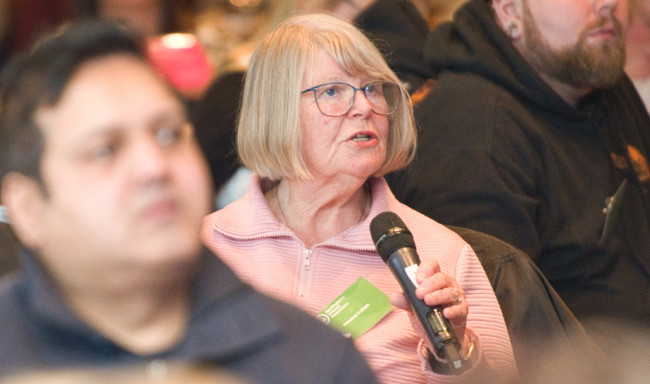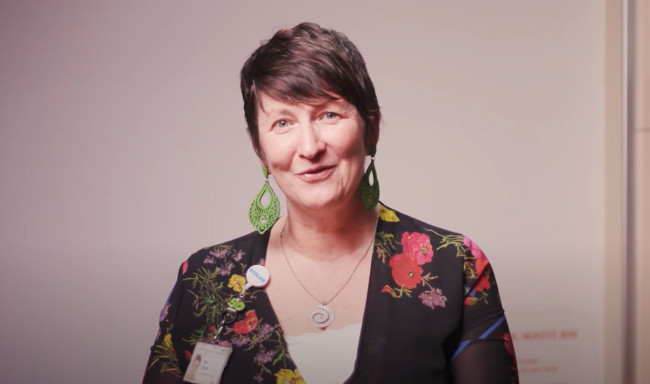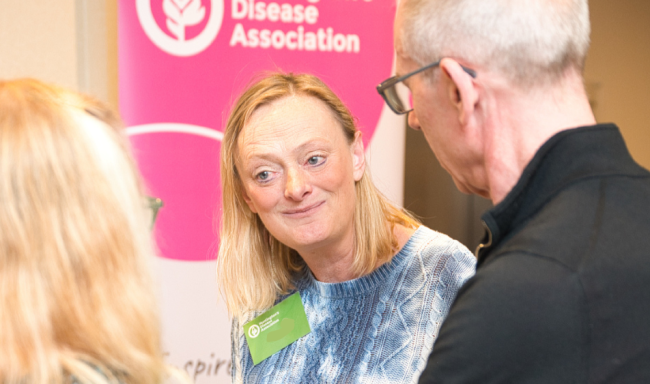James O'Connor from our Youth Engagement Service answers your questions.
James is the Team Leader of our Youth Engagement Service - HDYES. We asked the community if they had any questions about speaking with children about Huntington's disease and James has kindly answered them for us. All resources mentioned in the answers are linked at the bottom of the page.
How do I explain Huntington’s disease in a way that my child can understand, given their age?
"Children of any age can grasp the basics of Huntington’s and by opening that conversation when they are young allows you to build on those foundations. Keeping things simple and avoiding the complexity of the condition will help children to understand more easily. For example, Huntington’s is a brain disease. It changes how we move, how we think and how we feel."
What are some common emotional reactions children might have when learning about a family member’s Huntington’s diagnosis?
Everyone is different and there isn’t a typical reaction so below are a couple of the most common reactions:
- Understanding/sense of context because they understand why the family member is changing
- Sadness because they know the family member is poorly
- Frustration that they can’t stop Huntington’s. If a child is older and hearing about Huntington’s for the first time, then they may feel frustration because this has been kept from them
- Guilty because they can’t help as much as they’d like or if they’ve not known about Huntington’s and have had a lot of arguments or been angry with the family member
- Fear because the future is uncertain
How can I encourage my child to express their feelings and concerns about Huntington’s disease?
"Keep the conversation open and reassure your child that it’s a safe space to say whatever they want to. Use resources as a starting point. Try and talk in different places. Talking with children whilst driving is a fantastic way of helping them to open up as there is no eye contact and you’re in a different environment. Encourage them to engage with HDYES as no matter how hard we try, it’s sometimes easier for children to talk to someone independent from the family who they know is their just for them. We have piloted a program with LOHA to help families explore their emotions through guided activities - if successful, we will run this program again."
What signs should I look out for that may indicate my child is struggling with understanding or coping with Huntington’s disease?
"If your child regularly gets frustrated about what the person with Huntington’s is doing then it’s a good idea to gently open that up and explore if they understand why it’s happening. It’s normal to be frustrated, even if it is a symptom, so helping you child to understand whilst acknowledging their feelings is important. Children will change as they mature and so don’t be too troubled if they become more distant as they go through adolescent. Try to ensure they have a support network (HDYES, school, young carers, sports team etc) that you know they’re engaging with to ease your worries about they’re coping.
If your child is actively avoiding any time with the family member with Huntington’s then it’s a good to check in and try to establish why but not to judge their answers and try to support them to manage this going forward. It is often concerning if your child spends excessive amounts of time alone in their bedroom but this is an increasingly common scenario for many children. It’s not something to ignore and it’s always good to speak with HDYES or your family and friends but because technology allows for easily accessible entertainment and ability to socialise with friends in ways we didn’t have at that age. Self harm is an indication that your child is struggling and our language around this is important. We should avoid expressing disappointment as this can make children feel like they need to hide it in the future. Expressing concern for your child’s wellbeing and saying that you want to help is a positive way of acknowledging what has happened. Seek advice from HDYES, school or wherever you feel most comfortable."
Are there any resources or activities I can use at home to help my child feel more comfortable discussing Huntington’s?
"There are quite a few resources available and it depends on the age of your child. For primary age children we have our ‘Understanding Huntington's disease children's workbook' which is designed so parents/carers/trusted adults and children complete together. We have our Teenager’s guide which you could look at together. There are some great books such as Harry Needs a Hug and Finding Nana’s Smile which are for children and there’s Gene Hunter which is more for a teen audience. And there’s HDYO which is a brilliant online resource separated in age groups and could be a great thing to look at together to learn more about Huntington’s."
How can I address my child’s fears about genetic testing or their future if Huntington’s runs in the family?
"I don’t think you can address their fears as such. Sometimes as parents, the best thing we can do is to be there to listen and allow our children to talk freely with or at us. It’s always good to give the right information and to ensure that our children feel empowered but they also need a space where they can have affection and comfort without being told what to do, what to think or what’s out there. Testing is a personal choice and children/young adults should be reminded of this. Offer to share your journey and experience but respect that they may have very different views."
What support options, like counselling or group activities, are available for children whose families are affected by Huntington’s disease?
"HDYES is specific support for anyone 8-25 who has Huntington’s in the family. We are not counsellors but can provide emotional support, including psychological support, alongside education and a safe space to explore emotions. We run several local events throughout the year and hold these in different areas to maximise people’s opportunity to attend. We also have an annual summer camp where people can spend a few days together with other young people and we have group sessions focused on Huntington’s alongside outdoor activities. We also have two annual courses for parents. Our parents of adult children at risk course runs in February and March and focuses on supporting parents who have adult children so may need extra guidance on finances, genetic testing etc. Whereas our Navigating Huntington’s as a family course runs in April is for parents whose children are under 18 and is more focused on positive activities and emotional wellbeing."
How do I balance honesty with reassurance when my child asks difficult questions about the future or death related to Huntington’s?
"It’s important to be honest and it can help to ease their worry by giving context. If your child is ten and the family member is recently diagnosed then creating a timeline of significant life events that will happen whilst the family member is still alive can help your child to understand how long 20 years actually is. For example, you could ask: are you starting secondary school soon? How far away do your GCSE’s feel? Can you imagine leaving home? How long until you start driving lessons."
What role can friends or other supportive adults play in helping my child understand and cope with Huntington’s?
"I was going to avoid the cliché that it takes a village to raise a child but it’s so true and is particularly relevant here! Professional help, such as HDYES, and keyworker at school can be so beneficial as they are a separate space away from family that children can ask the most difficult questions to. It can be difficult to ask family because children don’t want to upset them. If your child can spend time with friends and the wider family then it gives you a chance to recharge your batteries and spend some time looking after yourself because self-care is vital in allowing you to support those around you."
How can I help my child maintain a positive outlook while living in a family affected by Huntington’s disease?
"By talking about Huntington’s as a family and checking in emotionally with each other you create a shared reality enabling everyone to be sensitive to each other’s needs. Talking also reduces stigma and creates solidarity that you are facing your challenges, as a family. Getting your child involved in activities helps to positively distract them from home and allows for small breaks for you. It’s important that we all are involved in things that we enjoy doing that also provide us with good opportunities for peer relationships."
Thank you so much to James for answering these questions for us.
Resources
Below are the resources that have been mentioned in this blog.




